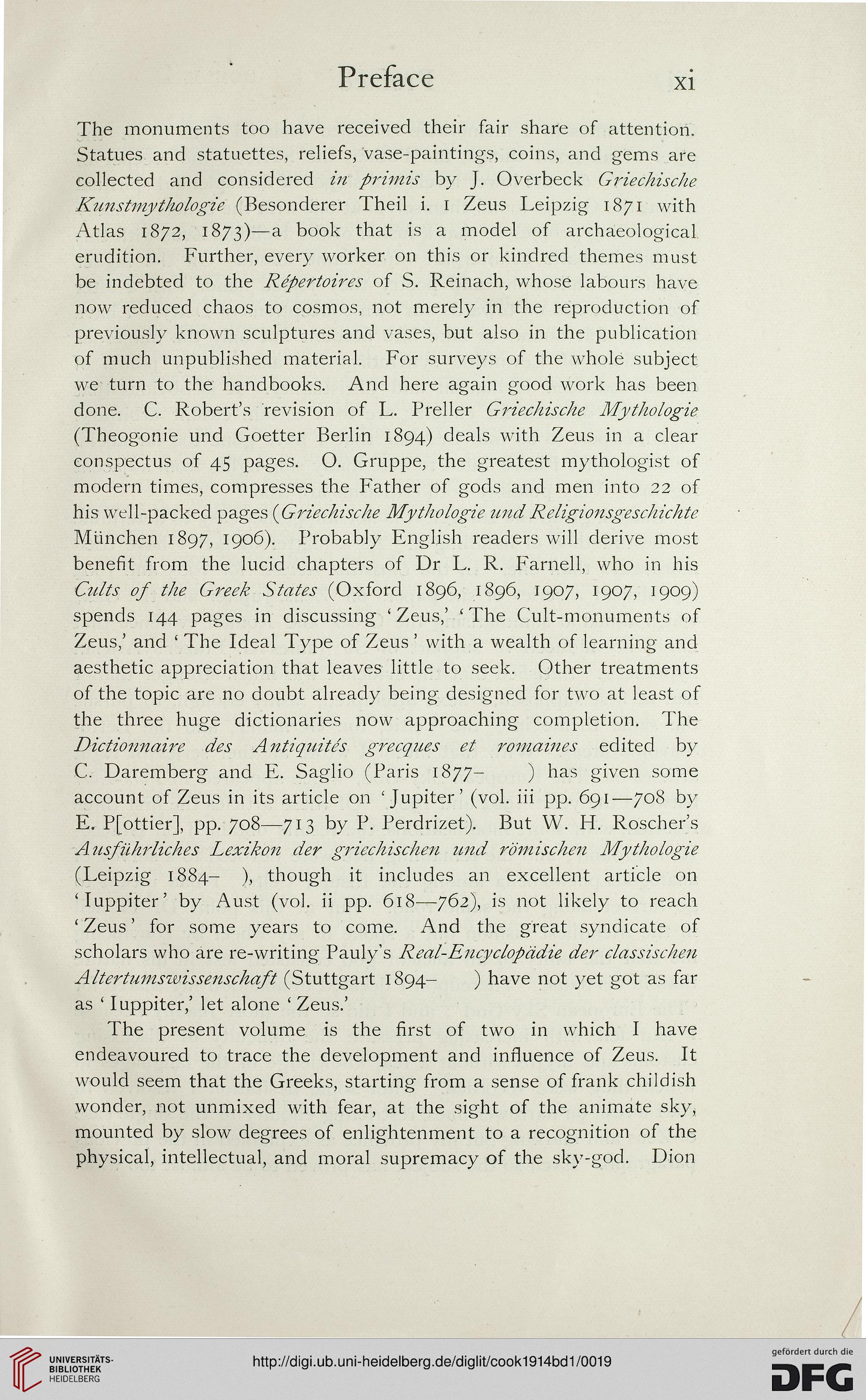Preface xi
The monuments too have received their fair share of attention.
Statues and statuettes, reliefs, vase-paintings, coins, and gems are
collected and considered in primis by J. Overbeck Griechische
Kunstmythologie (Besonderer Theil i. i Zeus Leipzig 18/1 with
Atlas 1872, 1873)—a book that is a model of archaeological
erudition. Further, every worker on this or kindred themes must
be indebted to the Repertoires of S. Reinach, whose labours have
now reduced chaos to cosmos, not merely in the reproduction of
previously known sculptures and vases, but also in the publication
of much unpublished material. For surveys of the whole subject
we turn to the handbooks. And here again good work has been
done. C. Robert's revision of L. Preller Griechische Mythologie
(Theogonie und Goetter Berlin 1894) deals with Zeus in a clear
conspectus of 45 pages. O. Gruppe, the greatest mythologist of
modern times, compresses the Father of gods and men into 22 of
his well-packed pages {Griechische Mythologie undReligionsgeschichte
Mtinchen 1897, 1906). Probably English readers will derive most
benefit from the lucid chapters of Dr L. R. Farnell, who in his
Cults of the Greek States (Oxford 1896, 1896, 1907, 1907, 1909)
spends 144 pages in discussing 'Zeus,' 'The Cult-monuments of
Zeus,' and ' The Ideal Type of Zeus' with a wealth of learning and
aesthetic appreciation that leaves little to seek. Other treatments
of the topic are no doubt already being designed for two at least of
the three huge dictionaries now approaching completion. The
Dictionnaire des Antiquites grecques et romaines edited by
C. Daremberg and E. Saglio (Paris 1877- ) has given some
account of Zeus in its article on 'Jupiter' (vol. iii pp. 691—708 by
E. P[ottier], pp. 708—713 by P. Perdrizet). But W. H. Roscher's
Ausfiihrliches Lexikon tier griechischen und romischen Mythologie
(Leipzig 1884- )) though it includes an excellent article on
'Iuppiter' by Aust (vol. ii pp. 618—762), is not likely to reach
'Zeus' for some years to come. And the great syndicate of
scholars who are re-writing Pauly's Real-Encyclopddie der classischen
Altertumswissenschaft (Stuttgart 1894- ) have not yet got as far
as ' Iuppiter,' let alone ' Zeus.'
The present volume is the first of two in which I have
endeavoured to trace the development and influence of Zeus. It
would seem that the Greeks, starting from a sense of frank childish
wonder, not unmixed with fear, at the sight of the animate sky,
mounted by slow degrees of enlightenment to a recognition of the
physical, intellectual, and moral supremacy of the sky-god. Dion
The monuments too have received their fair share of attention.
Statues and statuettes, reliefs, vase-paintings, coins, and gems are
collected and considered in primis by J. Overbeck Griechische
Kunstmythologie (Besonderer Theil i. i Zeus Leipzig 18/1 with
Atlas 1872, 1873)—a book that is a model of archaeological
erudition. Further, every worker on this or kindred themes must
be indebted to the Repertoires of S. Reinach, whose labours have
now reduced chaos to cosmos, not merely in the reproduction of
previously known sculptures and vases, but also in the publication
of much unpublished material. For surveys of the whole subject
we turn to the handbooks. And here again good work has been
done. C. Robert's revision of L. Preller Griechische Mythologie
(Theogonie und Goetter Berlin 1894) deals with Zeus in a clear
conspectus of 45 pages. O. Gruppe, the greatest mythologist of
modern times, compresses the Father of gods and men into 22 of
his well-packed pages {Griechische Mythologie undReligionsgeschichte
Mtinchen 1897, 1906). Probably English readers will derive most
benefit from the lucid chapters of Dr L. R. Farnell, who in his
Cults of the Greek States (Oxford 1896, 1896, 1907, 1907, 1909)
spends 144 pages in discussing 'Zeus,' 'The Cult-monuments of
Zeus,' and ' The Ideal Type of Zeus' with a wealth of learning and
aesthetic appreciation that leaves little to seek. Other treatments
of the topic are no doubt already being designed for two at least of
the three huge dictionaries now approaching completion. The
Dictionnaire des Antiquites grecques et romaines edited by
C. Daremberg and E. Saglio (Paris 1877- ) has given some
account of Zeus in its article on 'Jupiter' (vol. iii pp. 691—708 by
E. P[ottier], pp. 708—713 by P. Perdrizet). But W. H. Roscher's
Ausfiihrliches Lexikon tier griechischen und romischen Mythologie
(Leipzig 1884- )) though it includes an excellent article on
'Iuppiter' by Aust (vol. ii pp. 618—762), is not likely to reach
'Zeus' for some years to come. And the great syndicate of
scholars who are re-writing Pauly's Real-Encyclopddie der classischen
Altertumswissenschaft (Stuttgart 1894- ) have not yet got as far
as ' Iuppiter,' let alone ' Zeus.'
The present volume is the first of two in which I have
endeavoured to trace the development and influence of Zeus. It
would seem that the Greeks, starting from a sense of frank childish
wonder, not unmixed with fear, at the sight of the animate sky,
mounted by slow degrees of enlightenment to a recognition of the
physical, intellectual, and moral supremacy of the sky-god. Dion




